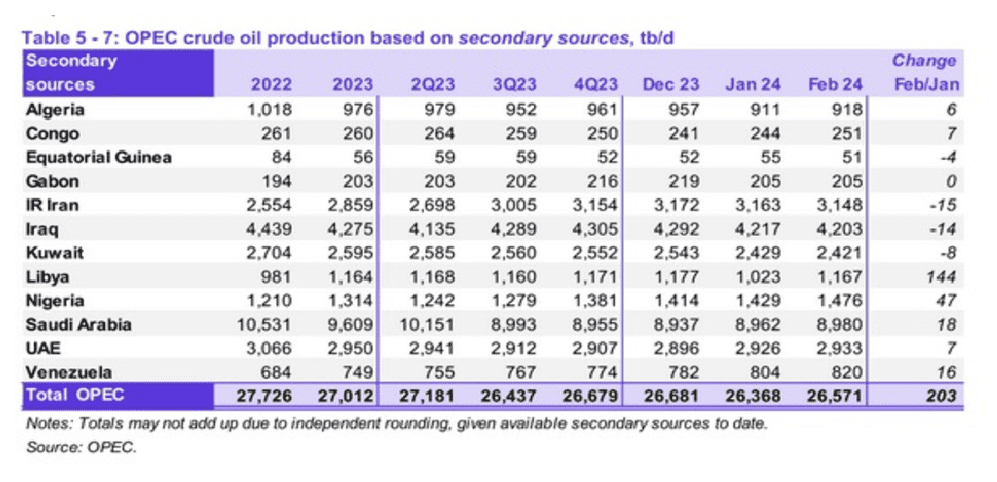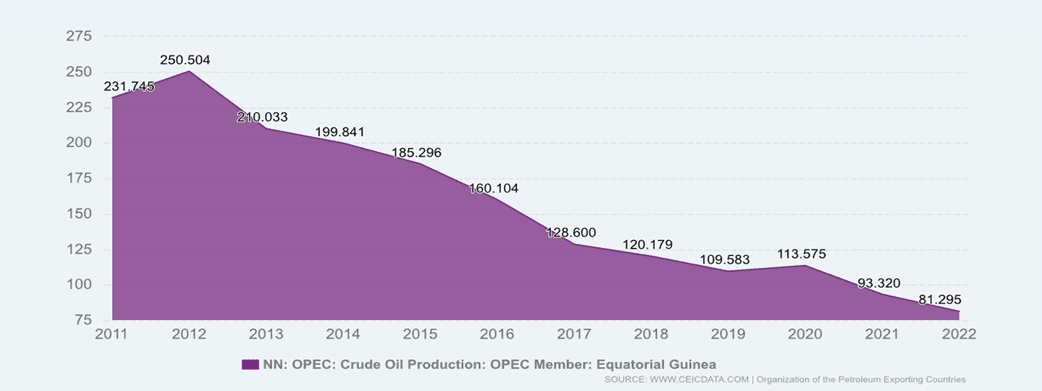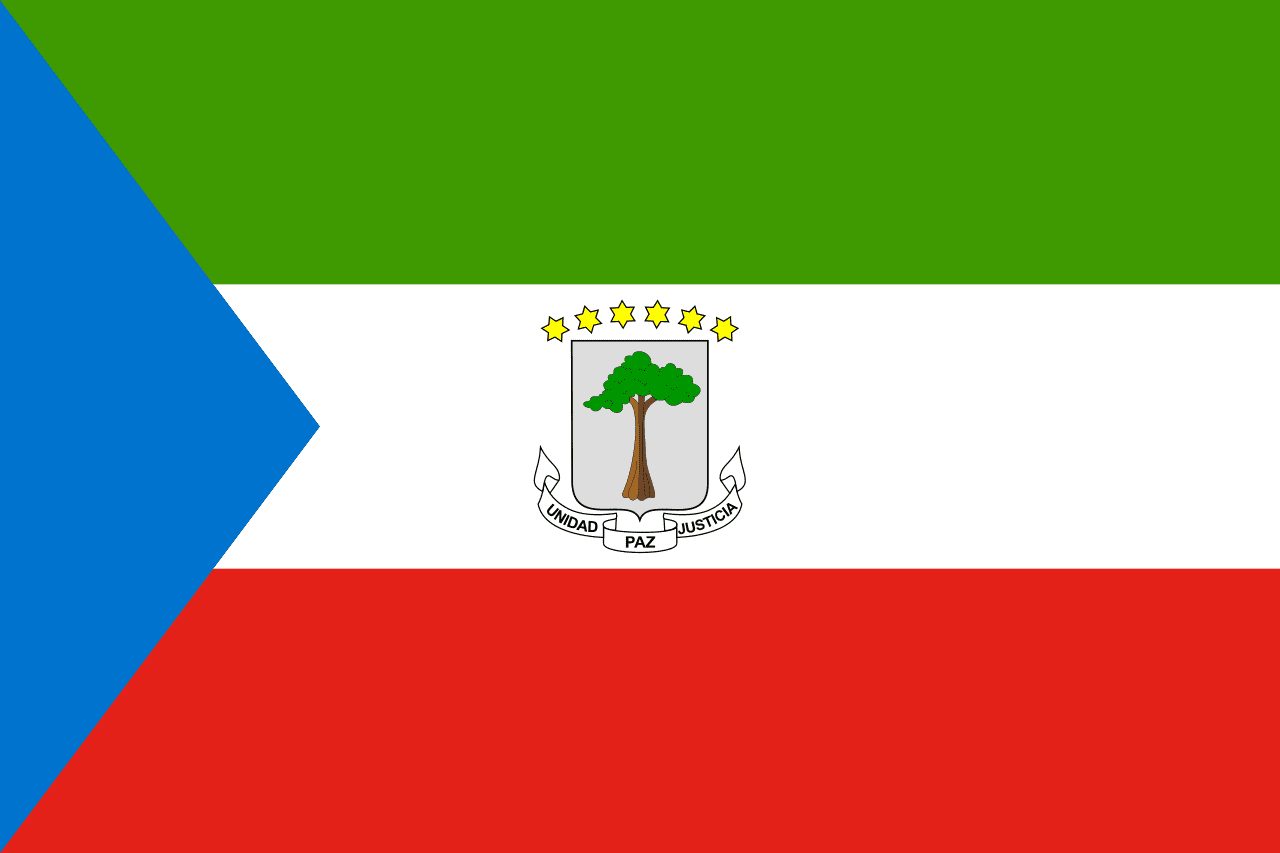The discovery of oil in Equatorial Guinea in the mid-1990s constituted an undoubted turning point in the country’s history. The country’s economy had previously been based on agriculture (largely coffee and cocoa) and the export of wood, until the dawn of the oil era.
The influx of multinationals (oil majors) in Equatorial Guinea’s energy sector was due to the attractiveness of the fiscal terms and the prospectivity that the country offered for foreign direct investment (FDI) compared to other countries in the region; so much so that the nation occupied the third place among Sub-Saharan African oil-producing countries in for many years, behind Nigeria and Angola.
In effect, the discovery of oil put an end to the economic primacy of the agricultural sector and promoted the activities of the oil industry, which very soon began to attract foreign investment, allowing the enrichment and financial autonomy of the country. Oil activities led to the implementation of other related industries, thus allowing the development of other economic sectors.
This was made possible through the country’s infrastructure investments and social projects, which in turn had a new, reliable source of finance. Prior to that, traditional products like coffee, cocoa, and wood made the Equatoguinean economy largely dependent on the economic aid it received from the great powers and international financial institutions (including the World Bank, International Monetary Fund, etc.). But the discovery and exploitation of national oil deposits allowed the country to free itself from foreign economic influence. As such, Equatorial Guinea was able to undertake a huge public infrastructure investment program that covered the entire national territory and oversaw the construction of roads, bridges, ports, airports, public housing, power plants, urban districts, hospitals, university campuses, and new cities, as well as the creation of new ministry buildings and town halls. At the same time, oil wealth led to a growth in public savings and investment, reaching the record figure of 3,784 million euros in 2009.
 To delve into the details, 534 million euros were invested in social infrastructure, 1,322 million euros in civil infrastructure, 997 million euros in productive investment, and 930 million euros in investment for public administration. Social investment grew by 116% in 2009, compared to an overall growth of 78%.
To delve into the details, 534 million euros were invested in social infrastructure, 1,322 million euros in civil infrastructure, 997 million euros in productive investment, and 930 million euros in investment for public administration. Social investment grew by 116% in 2009, compared to an overall growth of 78%.
At the same time, the country’s oil boom has generated other complementary industries, including the construction of a liquefied natural gas (LNG) plant, a methanol plant, a liquid petroleum gas (LPG) plant, among others. These developments have given Equatorial Guinea business opportunities across the economy and have played an important role in the diversification of economic activities, promoting investment in diverse sectors of society and giving the state control over the country’s affairs.
The current situation:
After years of frenetic activity in the energy sector, the country today faces a sharp drop in oil production, which has put it at the bottom of the production rankings of OPEC countries, as can be seen in the following chart:
The reasons for this decrease in production are manifold, but foremost among them is a lack of new discoveries. The last discovery made was in 2007 at the Aseng site. If constant exploratory activity is not maintained, new deposits will not be discovered, and production levels will become volatile.

Natural gas has performed relatively better, despite being a more mature industry than oil. The gas era began with the discovery of the Alba field in 1984, with production coming online in 1991, ahead of oil production. The field still accounts for approximately 45% of the country’s daily production and is a large supplier of feed gas for its LNG (EG LNG) plant, which has been operational since 2007.
The aging of the Alba field has reduced the country’s total production, which peaked in 2013. But the decline has been gentler compared to the precipitous decline in oil production. However, growing domestic demand for gas is further reducing the country’s export capacity.
Hoping to safeguard Equatorial Guinea’s gas exports and attract international interest, the government has set out a vision of establishing the country as a regional gas liquefaction hub, receiving gas from domestic fields, as well as from neighboring Cameroon and Nigeria, to process it and export it to international markets. Such a plan would extend the lifespan of our EG LNG facility, which has been in difficulty since gas supplies from the Alba field began to decline. The project is progressing at a slow pace due to obstacles like negotiations with neighboring countries on developing cross-border oil and gas fields, securing potential supplies, and building connecting pipelines.
In 2019, the country launched a licensing round to auction 27 oil and gas blocks. In the end, three blocks were awarded to small players. In 2023, the government adopted an “open door” policy, whereby any company could express interest and enter into direct negotiations with the government. In 2023, a block was awarded to Panoro Energy as a result of these negotiations.
An open-door strategy is generally adopted when the success of a bidding round is in doubt. Indeed, bidding rounds are the superior and most widely used strategy for allocating oil and gas licenses. However, their success depends on several factors, some of which go beyond a country’s borders, such as prevailing oil and gas prices, while others are related to the country’s potential. When prices are high and the country’s oil and gas sector has promising prospects, competition among bidders tends to be strong, resulting in a windfall for the government. A failed bidding round that does not attract enough interest can damage a government’s negotiating position. To avoid such an outcome, governments use direct negotiations.
With aging assets, technically challenging small fields, and high exploitation costs, Equatorial Guinea is among the producers that are particularly exposed to the pressures of the energy transition. The government’s priority should be to extend the lifespan of its hydrocarbon sector, which represents around 85% of its GDP and just over 75% of its tax revenue, by remaining open to offers from smaller players. Governments usually prefer to work with large industry players that have a presence on their home soil, given that smaller players lack adequate financial and technical resources. It also makes it easier to negotiate new agreements. However, a change in the structure of the industry is expected as producing oil fields become more mature. The government should adopt measures that will help it adapt to this new phase.
To improve the attractiveness of investing in the country, the government announced several tax incentives, effective from early 2024, including reducing the corporate income tax rate from 35% to 25%. These measures could help but are not enough to offset the limited potential needed to generate the kind of rewards big players typically require. In fact, we believe that the measures adopted are too timid and that more forceful actions should be implemented in the short term to save and reactivate the sector that constitutes the backbone of the country’s economy.
There are no miracles in the oil industry, the only alternative is to apply the “Drill baby Drill” theory, which means drilling and drilling more exploratory wells to maintain or increase production levels. For this, certain incentive actions are necessary:
1. Resolve the problem of the New BEAC Change Regulation. This highly bureaucratic and suffocating process has become the biggest obstacle and brake on foreign direct investment in Equatorial Guinea’s oil sector.
2. Tax incentives.
- Exemption from payment of tax on assignments and transfers of assets in the oil sector for companies in the exploration and development phases. This measure would revive the appetite of independent companies to invest in the Equatoguinean oil sector and would revive exploratory activity in the country, motivating agile companies dedicated to exploration, thus favoring the farm-in and farm-out processes.
- Tax holidays on the payment of corporation tax (IS) for a negotiable period for new deepwater gas field contracts.
- Tax holidays on the payment of corporation tax (IS) for a negotiable period for new contracts for gas fields in shallow waters.
- Tax holidays on the payment of corporation tax (IS) for a negotiable period for deepwater crude oil field contracts.
- Tax holidays on the payment of corporation tax (IS) for a negotiable period for crude oil field contracts in shallow waters.
- Tax credits for operating companies that train Guineans and whose management positions are occupied by nationals for contracted companies as follows:
- Exemption from the payment of customs and parafiscal duties on the import of equipment and machinery intended for oil operations in favor of local companies operating in the sector.
- Tax credits for operating companies that partner with local companies for the establishment of research and development (R&D) centers in Equatorial Guinea.
- Although the issue of transfers abroad is not a tax issue, we appeal to the Ministry of Finance and Budgets to take action on the matter because this issue has become one of the greatest obstacles to foreign investment into Equatorial Guinea.
3. Regulatory and legal stability. Investors seek stability in the regulations and laws that govern the oil sector. Constant changes in regulations can increase uncertainty and deter investment.
4. Ease of acquiring permits and regulations. Simplify the processes of obtaining permits and licenses, streamline bureaucratic procedures, and reduce the regulatory burden for companies in the oil sector.
5. Training and education. Promote training and specialized training programs in the oil sector to guarantee the availability of qualified labor.
6. Legal security. Ensure a stable and predictable legal environment to attract long-term investments in the oil sector.
7. Incentives for innovation and technology. Stimulate the adoption of innovative technologies in the oil industry through financial incentives or R&D support programs.
8. Promotion of sustainability. Promote sustainable practices in oil extraction and production.
The role of Gepetrol.
With the transfer of MEGI’s assets to Gepetrol SA, the company has the opportunity and potential to become one of the most vibrant national oil companies (NOCs) in Sub-Saharan Africa. Its association with PETROFAC as a technical partner for the operation of the ZAFIRO field will not only allow the company to acquire the experience and technical and operational capacity necessary to effectively and efficiently manage Block B, but also to be an active partner in the operation of other oil fields to represent the interests of the state.
Equatorial Guinea is in a transitional phase of formulating projects and transformative strategies aimed at diversifying its economy, the results of which have yet to be felt, but which will considerably reduce its high dependence on the oil sector.
The fact remains that more than 80% of the country’s GDP comes from the hydrocarbon sector and this scenario is not expected to change in the medium term. It is for this reason that we invite all actors in the sector to adopt whatever measures are necessary to save “the goose that lays the golden eggs.”
SOURCE: African Energy Chamber






